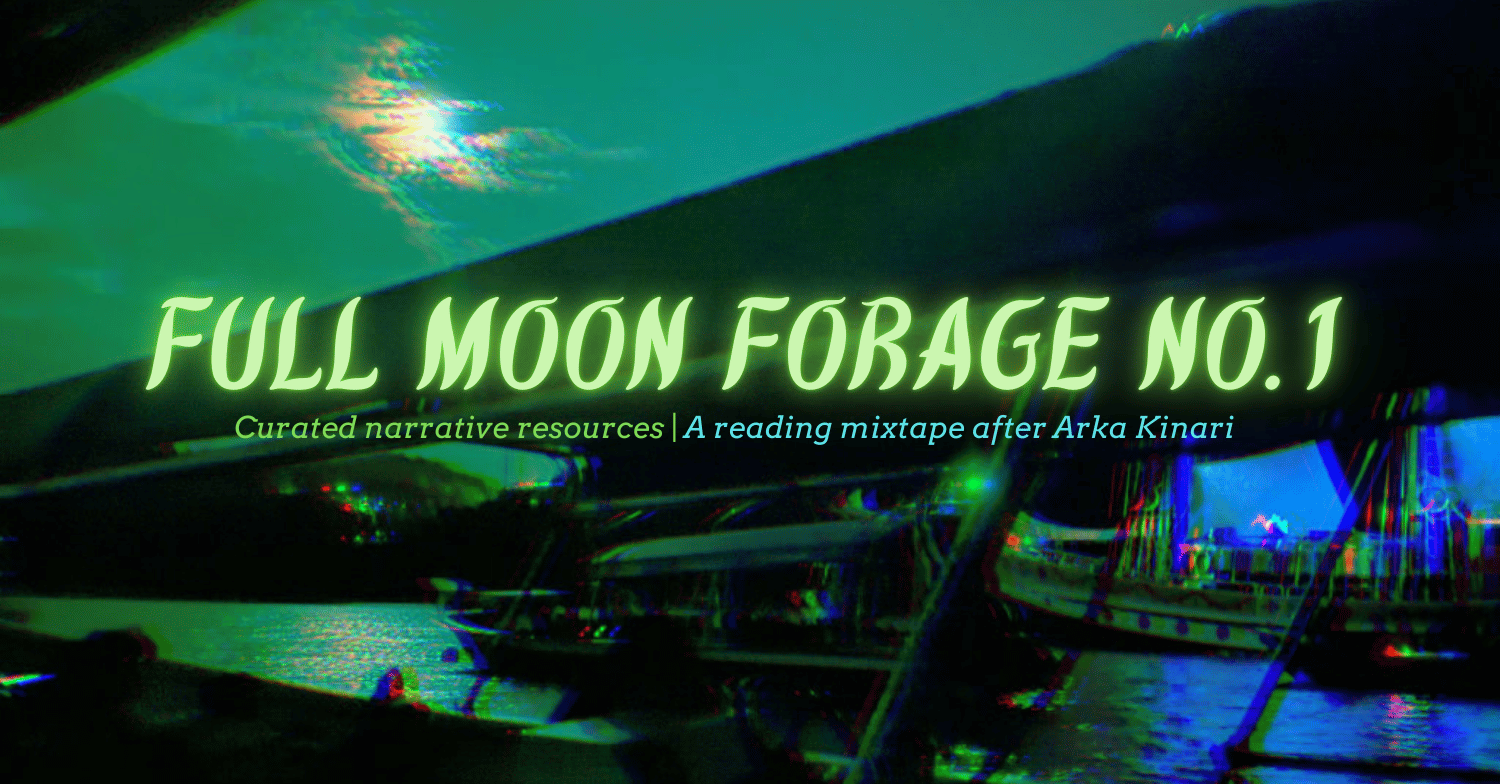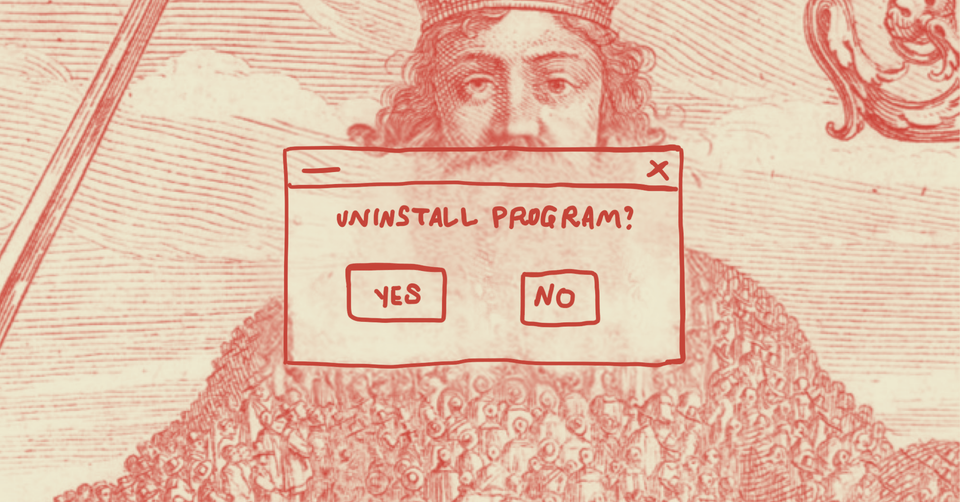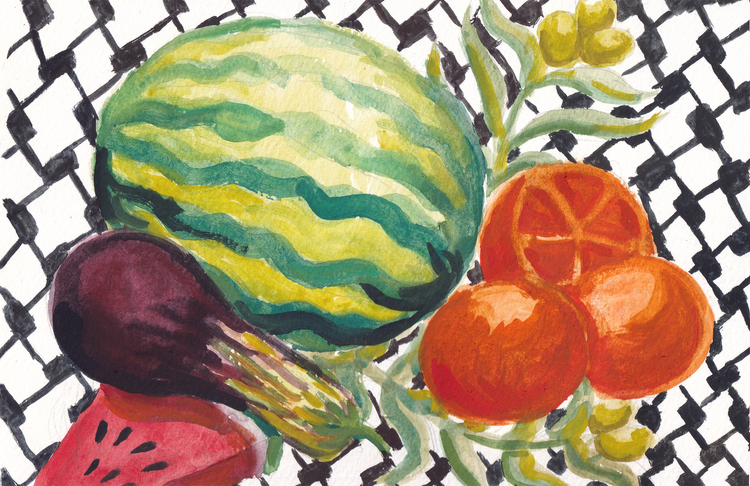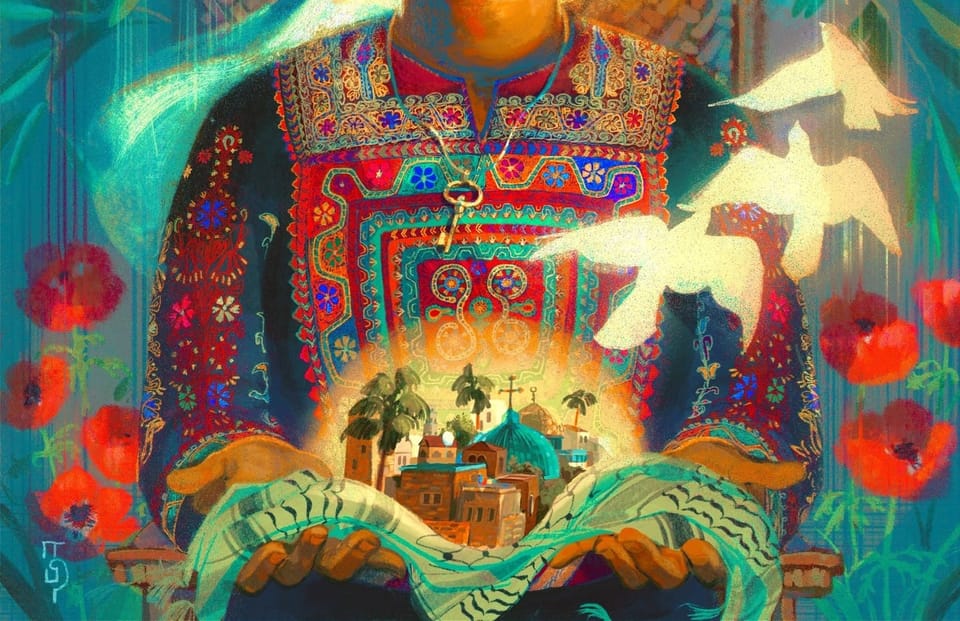Survival of the Friendliest: To remember who we are
The monsters up top want us to believe our love, tenderness, and affection for each other will only get in our way. But in times of crises, humans get together and become our best selves.
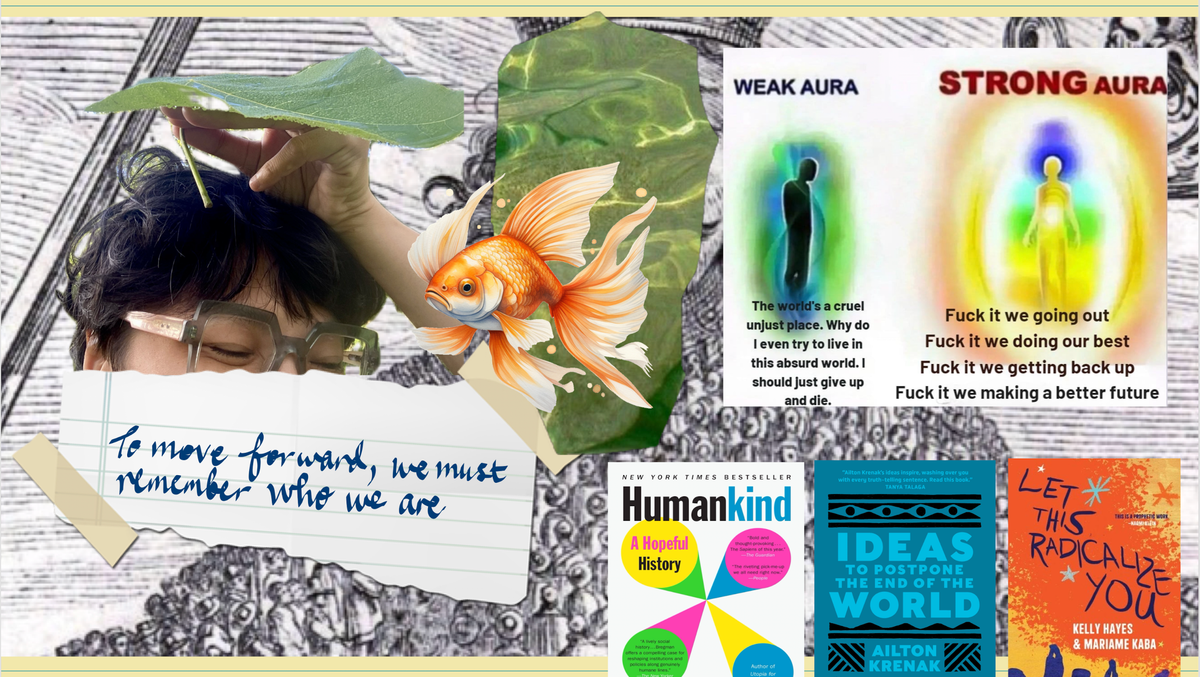
Previously, we dismantled the 400 year-old colonial myth of innate human selfishness. But what are we hardwired for then if not competition and brutality? And what do we do about it?
- Recognise the truth literally inside us. We don't have to look very far to know the truth about human nature: its signs are in our design. It has always been about the Survival of the Friendliest. If we were evolved to be solitary and aggressive, we would have evolved paranoid and prickly features. Instead, we are the only species who can blush.
- Reject the illusion of self-reliant survival. Even a wilderness survival instructor will tell you that human friendliness is and will be the most important survival skill we have. It isn't a weakness that we were wired this way. Our ability for solidarity is our greatest evolutionary advantage. It is true that we cannot survive in isolation, and it is also true that we are able to do anything when we collaborate and organise together.
- Get mad in the right direction. The owning class is very motivated to persuade us that any attempts to solve our problems together are illegitimate or even immoral. The monsters up top want us to believe our love, tenderness, and affection for each other will only get in our way. This is why we must be precise with our blame. When we say humans are the worst thing to ever happen to the planet, we are blaming EVERYONE for the problems caused by the unnatural extractive circuit of death production. We let the real wrongdoers off the hook. Their fantasies of the future conceal the truth: They need workers more than workers need them.
- Retire from doomerism. Doomers are a gift to the world eaters. Evil sustains itself by saying the problems they cause will last forever. We must get it out of our heads that it is rational to see this as a doomed time and then simply wait for the end. Humans are not very good at predicting what's to come. Sometimes we think what we are experiencing will last longer than it actually does. Optimism is not just revolutionary. It is an objectively more rational response than doomerism, because it takes into account that cycles of change are part of reality. Change is inevitable friend, and it is happening all the time.
- Remember that we have always rescued each other. Studying the past shows us repeatedly that in times of crises, humans become our best selves. Yes some people will still be manipulative in a traumatising society that systematically fails us. But over and over again, we see cooperation and collaborative care are the most common human responses to disaster.
- Build your present with others. We have to earn our progress. We move out of the old world by practicing, by teaming up in solidarity to turn world-eater fantasies into nightmares. Getting organised is the only way we win. The past shows us that meaningful social change has always come from organised mass movements deciding enough is enough and to try something new.
Those were the main points I wanted to make. Keep scrolling to the steps that intrigue you most, or carry on with your day!
Step 1: Recognise the truth literally inside us
In his 2019 book Humankind: A Hopeful History, Rutger Bregman made a strong case that humankind evolved through the Survival of the Friendliest, not the "Fittest" (which as I've written about before is a colonial program we must uninstall).
We are hardwired to relate to others, to learn, bond, and play together. If we really were competitive and aggressive in nature, why didn't we evolve paranoid and prickly features? Why do we track the whites of each other’s eyes, why do our bodies leak emotions, and physically suffer when we are lonely?
The evidence of Survival of the Friendliest is built into our bodies. Instead of fangs or poisonous neon skin, we are the only species who can blush. We yearn to connect like we hunger for food. It makes sense that medical research on prisoners proves that long-term solitary confinement is the equivalent of torture.
Step 2: Reject the illusion of self-reliant survival
Human friendliness is and will be the most important survival skill we have. This is to say that the fantasy of the rugged independent individual is just another scam, especially for those who love apocalypses too much. Many people who worry about catastrophe and collapse are preparing for the wrong apocalypse. Being self-reliant is for running; it is community care that is essential for long-term survival.
As Chris Begley, who is a wilderness survival instructor, anthropology professor, and author of The Next Apocalypse: The Art and Science of Survival, has argued, many people who worry about catastrophe and collapse are preparing for “the wrong apocalypse.” Begley argues that while the survival skills he teaches, such as how to build a fire or purify water, can be important in a crisis, “social and political skills, and more immediately, how you treat people, will be most important in ensuring survival in the end.” Having studied apocalyptic events across the course of human history, as well as the likely disaster scenarios of our time, Begley quashes notions of rugged individualism, insisting that “basic traits like kindness, fairness, and empathy” will be the basis of any sustainable, meaningful effort at collective survival—and as Begley stresses, we cannot survive alone. — Kelly Hayes & Mariame Kaba in 2023, citing Chris Begley, 2021
Not only we cannot survive alone (we were not meant to) it also isn't some weakness that we were wired this way. It's our most powerful evolutionary advantage. We are able to do anything when we organise together. We can see this is true from how much money / effort / tech is spent on preventing different people from getting together, listening to each other, cooperating on a shared effort like a workers' union. They wouldn't be this obsessed with us if we weren't so important to them.
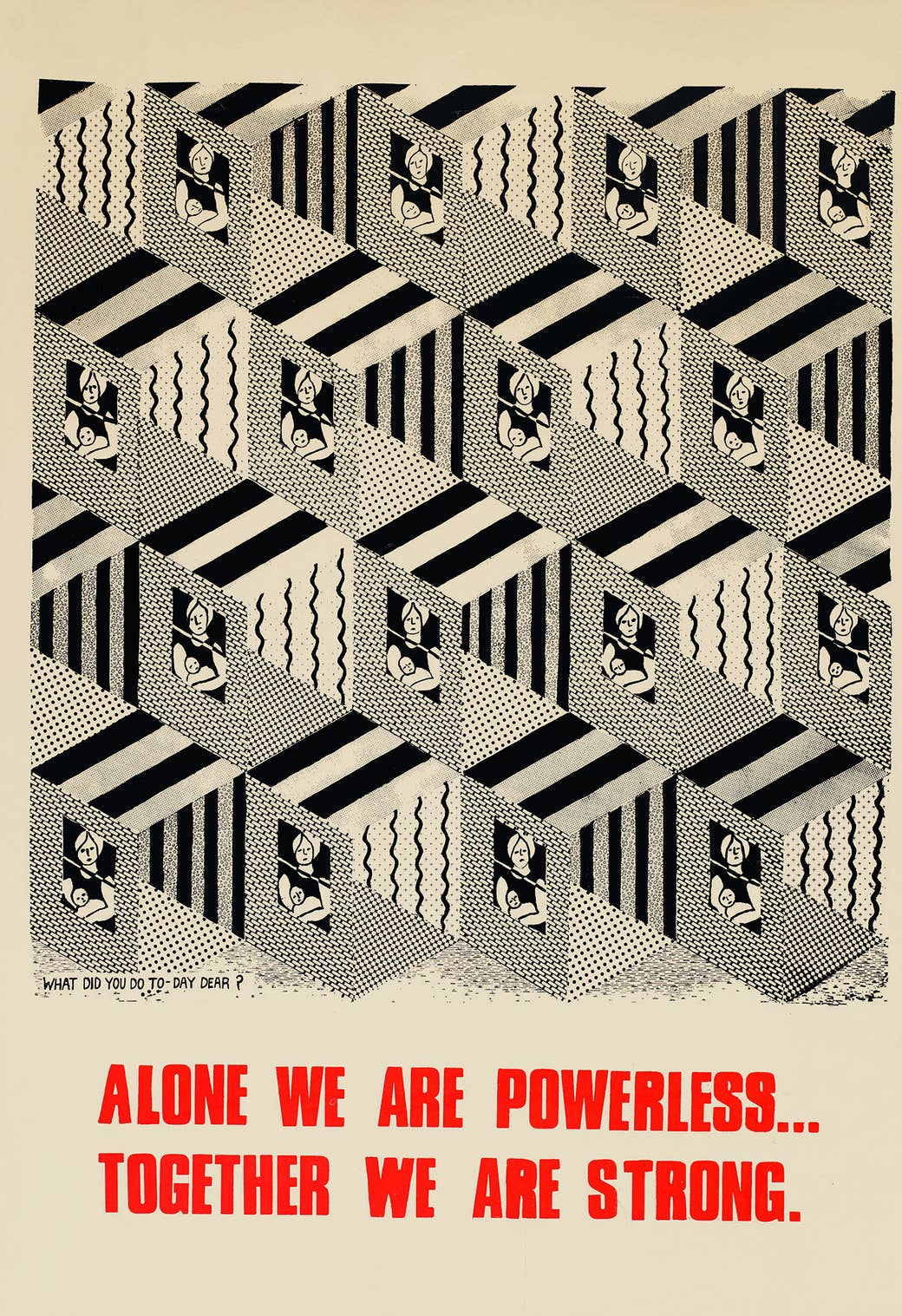
Step 3: Get mad in the right direction
Of course installing the colonial program that it's human nature to compete is a profitable thing to do for the ones who exploit us. The competition that myth creates still generates capital for capitalists.
But is that the only reason that the myth stays so sticky and strong today?
The monsters up top know that we are the real threat to their power. To be a Hobbes hater again here: When he said that an all-powerful sovereign is necessary for peace in society, what he was REALLY saying is those hordes of peasants cannot be trusted to manage themselves peacefully and safely UNLESS they are dominated by the ruling/owning class. Apparently we the working class will only endanger ourselves over and over again until the hoarders step in to control us. I beg your every available pardon? We still see this rhetoric everywhere today— let's always take it personally gang!
Oppressors set up the world to make us think that we need them, but it is that they need us. They need to have influence over us to hold their power. But we are the influence, and we can take back our power completely. Our time, attention, data and labor are their everything. We are the reason for their entire existence. We are their whole world. We are the influence. We are the outcome. We determine the next move. — YK Hong, 2025
The monsters up top want us to believe our love, tenderness, and affection for each other only gets in our way. In March 2025, the richest man ever (at the time) told one of the most popular podcasters online that empathy is a bug that makes civilisation weak. His critique of empathy echoes the Reich Minister of Propaganda in 1942 warning Germans that being too sympathetic to others would destroy their project. Meanwhile the billionaire exploits USA's poorest communities for his experimental space fantasy.
What does the billionaire and celebrity obsession with someday leaving Earth for space shows us? That a common characteristic of neoliberal fantasies is an escapism that lacks imagination. The ruling class expose themselves in their fantasy of detaching from an ungrateful world: Money makes one so abnormal that they managed to forget that they are the ones totally dependent on the labour of others, even in their own homes.
Workers don't need billionaires to run their lives, but the billionaires definitely need workers. How comically unrealistic it is then for them to fantasise of escaping regulation, obligation, democracy, to wide open space, as if power, greed, and control wouldn't follow them there. Will they suddenly begin to do their own laundry, their own meals, produce their own Botox? Did they imagine dirtying their hands doing machine repairs?
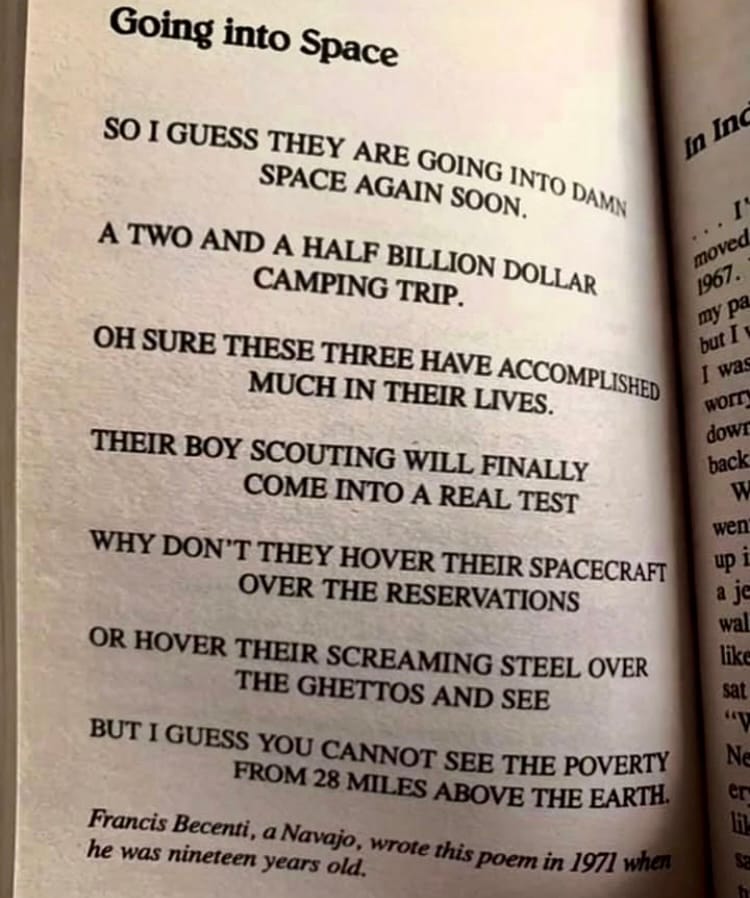
In early 2024, scientists 'discovered' the world's largest snake while filming a National Geographic Disney+ series in the rainforests of Brazil. A few days later, she was found dead. Since she was healthy and in the prime of her life when she died, the Dutch researcher who swam with her condemned the hunters. And of course, in came the comments about how shit people are, and that humans are the worst ever.
But did that snake not spend years growing 26 feet long, sharing space with Indigenous communities, and survived up to that point? Indigenous people have been right with nature for thousands of years.
... unless the old scripts animated by false notions of superiority and inferiority are ripped to shreds, we will be caught in an endless purgatory: forced to inhabit the same tired roles as we advance predictable and deadly plots. Instead, let us clear the way for new stories! Let us follow the example of Indigenous protesters who demand that we smash death-making structures and construct new ones that give us life. — Ruha Benjamin, 2024
This is why we must be precise with our blame. When we say humans are the worst thing to ever happen to the planet, we are blaming EVERYONE for the problems caused by the unnatural extractive circuit of death production. We let the makers of 'The Market' off the hook, when we should be building life outside of those death-making structures.
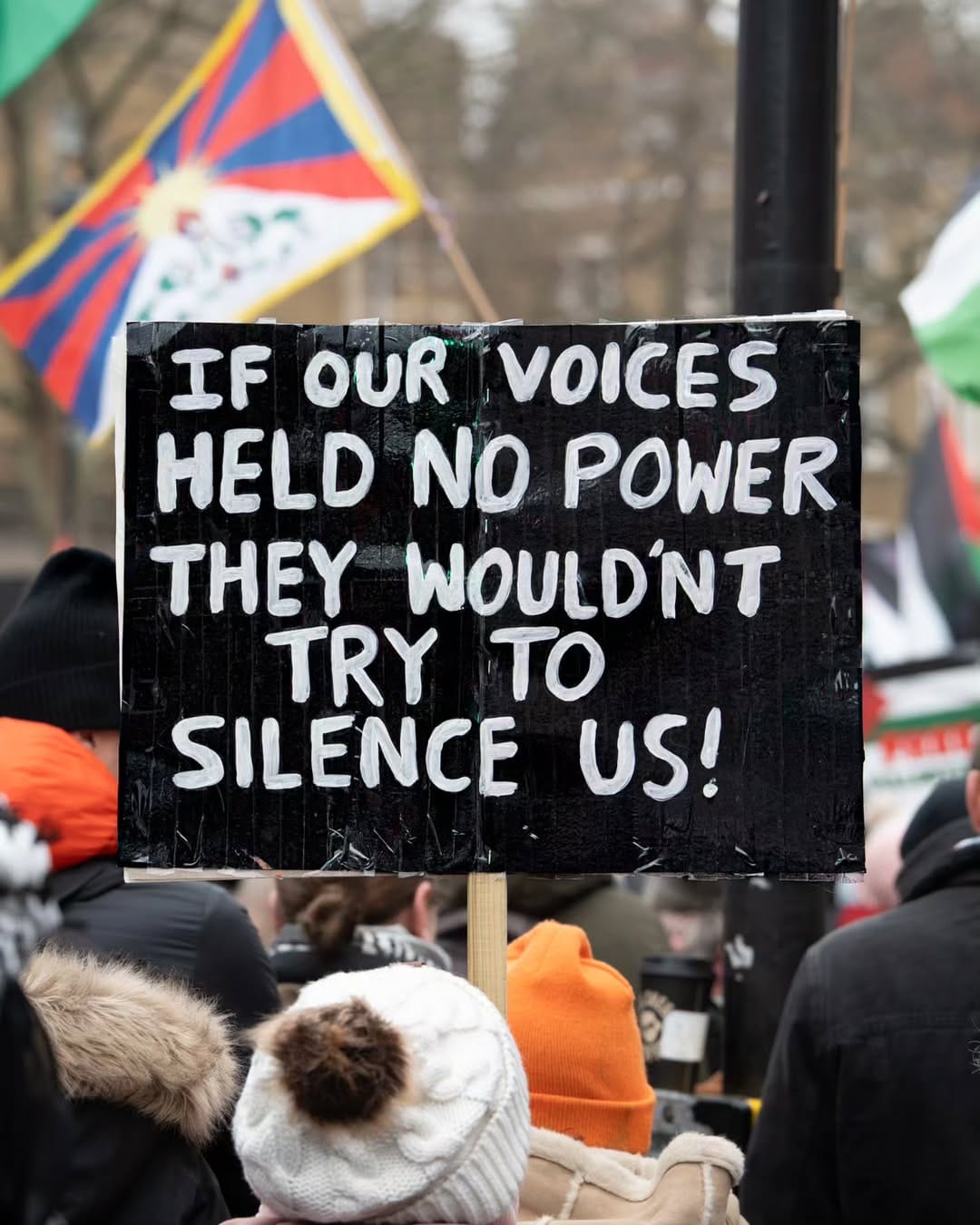
Protestor in a crowd holds up a sign, 2025: ”IF OUR VOICES HELD NO POWER, THEY WOULDN’T TRY TO SILENCE US!”
Step 4: Retire from doomerism
How does evil sustain itself? By saying our problems will last forever. By forcing into being the situation it says is inevitable, a kind of zombie humanity that wants us to give up on our dreams, to kill all joy of being alive. It persuades us that buying something will transform us into a more enviable version of ourselves, yet this transformation only makes us poorer. Maybe when people fear the end of the world, what they really fear is the end of the joy they get from buying and owning things.
The times we're living in are expert at creating absences: sapping the meaning of life from society and the meaning of experience from life. This absence of meaning generates stringent intolerance toward anyone still capable of taking pleasure from simply being alive, from dancing, from singing. There's still a whole constellation of little groups of people who dance, sing, make it rain. The kind of zombie humanity we're being asked to join can't bear so much pleasure, so much fruition in life. So they holler on about the end of the world in the hope of making us give up on our dreams. — Ailton Krenak, 2020
We must get it out of our heads that this is a doomed time and we are simply waiting for the end. In comparison, the optimism of the oppressed is far more rational. It is more effective at adjusting and sustaining itself within the cycles of an ever-changing life. The oppressed knows every empire falls, that change is inevitable.
Even when you feel like you are stuck in one place, you're factually not. Your cells are constantly dying and being born at different speeds. Cells in your colon regenerate every three to five days. Your body is constantly changing, and your environment is constantly changing. You might think it's rational and based to accept that nothing good will ever happen, that this is the way things will be, that we'll never make things better. We're all fucked. There was a person in 1400s Hungary who thought the exact same thing. Kingdom had been around for far longer than capitalism has been around by now. — Elliot Sang, 2024
Humans are actually not very good at predicting the future. We do not even consistently notice when our own relationships or health issues are falling apart. Sometimes we forget some things haven't always been the way it is, and sometimes we think what we are experiencing will last longer than it actually will.
There is a tendency to think that what we see in the present moment will continue. We forget how often we have been astonished by the sudden crumbling of institutions, by extraordinary changes in people’s thoughts, by unexpected eruptions of rebellion against tyrannies, by the quick collapse of systems of power that seemed invincible. [...] Looking at this catalogue of huge surprises, it’s clear that the struggle for justice should never be abandoned because of the apparent overwhelming power of those who have the guns and the money and who seem invincible in their determination to hold on to it. That apparent power has, again and again, proved vulnerable to human qualities less measurable than bombs and dollars: moral fervor, determination, unity, organization, sacrifice, wit, ingenuity, courage, patience— whether by blacks in Alabama and South Africa, peasants in El Salvador, Nicaragua, and Vietnam, or workers and intellectuals in Poland, Hungary, and the Soviet Union itself. No cold calculation of the balance of power need deter people who are persuaded that their cause is just. — Howard Zinn, 2006
Step 5: Remember that we have always rescued each other
The study of disasters makes it clear that there are plural and contingent natures, but the prevalent human nature in disaster is resilient, resourceful, generous, empathic, and brave. — Rebecca Solnit, 2009
In every real crisis, the most common human response is not panic, but mutual aid. Although some people will still be manipulative in a traumatising society that systematically fails them, cooperation and collaborative care are common human responses to disaster. Numerous stories bear this out, I have known it to be true where I live (for example, in my recollection of community-organised mutual aid during COVID-19 lockdowns where the state failed us). Maybe your our own experiences of local crises confirm it too.
Obviously, other people can and do harm us, regardless of how much we share. But the conditions that alienate us and enable harm are wholly alterable. People are capable of generating social mechanisms and relations that foster safety and understanding within communities. People are capable of overcoming, or at least negotiating, difference for the sake of their common interests, especially in moments of crisis. As the unprecedented flourishing of mutual aid projects during the pandemic has demonstrated, many people respond to communal crisis with generosity and shared concern. The idea that disasters autogenerate panicked, aimlessly violent hordes of people who must be controlled with an iron fist is an authoritarian fever dream. While the powerful would have us believe that frightened people are always selfish and hypervigilant, cooperation and collaborative care are common human responses to disaster. — Kelly Hayes and Mariame Kaba, 2023
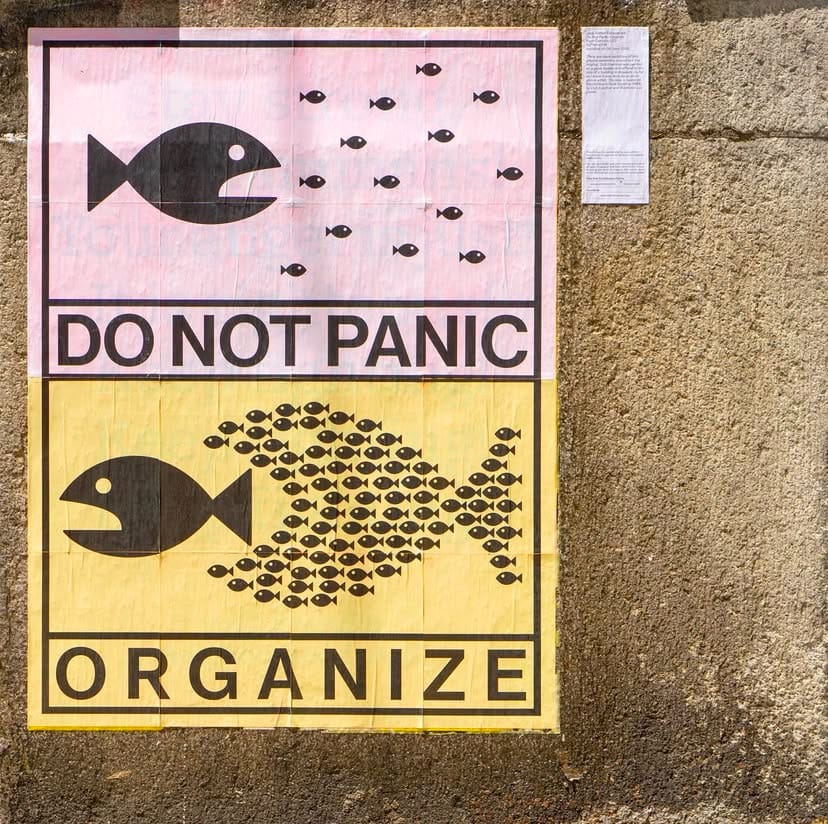
Step 6: Build your present with others
But progress is not inevitable. It is not a given. We get progress as the result of sustained ongoing open-ended resourcing and collaboration. We must team up to turn billionaire world-eater fantasies into nightmares.
Their power comes from you believing in them. They need your money, your approval, your complacency to win. If we stop buying into them, they die. These guys are fucking weak. They have everything and they can’t even stand to be disliked or live through a few days of declining stock prices without freaking the fuck out. Everything that you’ve had to fight for, your job, your savings, your safety, they’ve had handed to them. And now they have made it clear that they think they are entitled to your money too. But they’re not. The harder you boo, the more you protest, the more their stock price drops, the more you turn their fantasy into a nightmare, these protests work. Refusing to comply works. It is easy to see the future you fear as inevitable, especially one being sold to you by a couple of billionaires and the people you’re up against are so rich and so powerful. But their fantasy of the future is not any more inevitable than ours. By working together, we have the power to build the future we want. I suggest you get busy fucking doing it. — Adam Conover, 2025
Your most important survival skill is your ability to be friendly, to cooperate, and to organise. Practice it now.
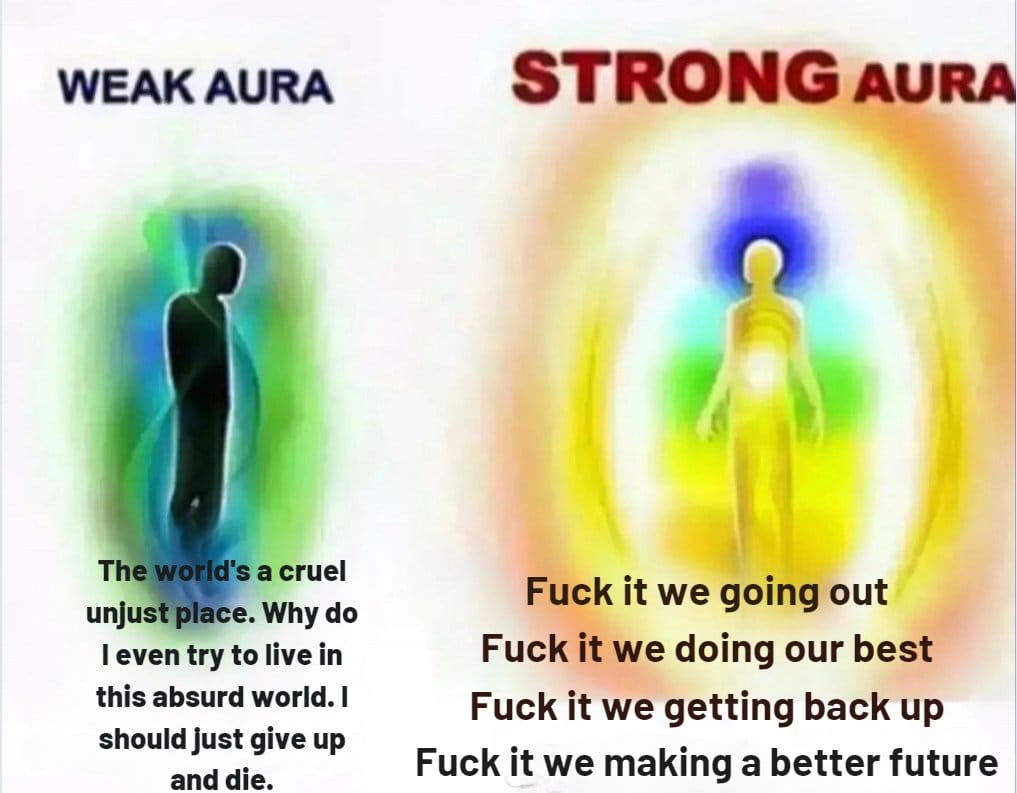
Getting organised is the only way we win. We have been conditioned to overestimate the value of individual actions. But exploring the past will show that mass actions for change have always been organised, even when they seem spontaneous.
When you reach the point of political doomerism, that nagging voice that says yes this is bad but there's nothing you can do about it peasant, you have two options. You can continue to mope and whine and wallow in self pity, or you can realise that reaction is programmed into you and choose to do something about it. What's the other option, roll over and die? Accept as inevitable that a handful of people with more power than God have the right to Doom our entire species to sate their greed? No! While you are alive, you try. You try to force change. We are weak only when we act alone. The hyper-individualism of capitalism has conditioned us to believe we are solitary creatures looking out only for ourselves, and that only through individual actions we can decide our fate. That is a lie. Look through any history book and you'll see that the drivers of change have always been mass movements. Masses of people deciding enough is enough, they're trying something new. I know it's scary, I know it's not what you hope your life would look like. But this is the hand we've been dealt. Humanity is at a crossroads. Down one road, we have the genocidal accumulation of capitalism and extinction. Down the other, is survival and the birth of a new socioeconomic order. We get to choose. Make the right choice. Choose to work for a better future. Ignore that insidious voice in your head that says: This is just how things are. You think like that, and there's nothing separating you from the feudal serf kissing the ring of his lord. — Second Thought, 2024.

References
For full notes / sources, see the reference channel: are.na/liy/fake-human-nature-fantasy
